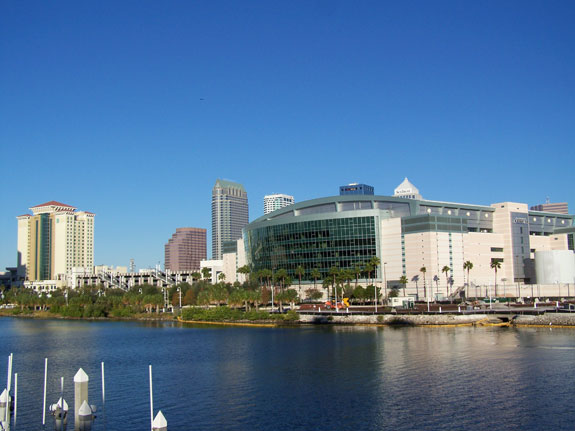
The 2012 Republican National Convention in Tampa is still 10 months away, but it's already stirring controversy. (Photo: Wikimedia Commons.)
By Ralph De La Cruz
Florida Center for Investigative Reporting
The 2012 Republican National Convention is still 10 months from landing in Tampa, but it’s already making plenty of local headlines.
First there was the story in the St. Petersburg Times that, despite contracts, convention organizers told Tampa-area hoteliers last Wednesday that they needed to lower their rates and increase the kickback to the convention.
They weren’t so much renegotiating as demanding. The hoteliers were given forms that they were supposed to fill out with the new rates and turn in by Friday. Only a member of the Corleone family would consider that a negotiation.
On Tuesday, convention organizers, obviously aware of how their heavy-handedness was playing out, met in private with hoteliers to try to work things out.
The whole thing has allowed citizens to get a rare glimpse into the complicated arrangements that bring big events such as party conventions to cities.
Usually, the only thing the average Joe hears about when it comes to these mega events is how many tens of thousands of visitors will stream into their city and how local businesses — particularly hoteliers and restaurateurs — are going to make millions and hire hordes of locals.
Well, these recent stories remind us that reality is actually full of special rates and anticipated favors, even kickbacks — fees paid by hoteliers to help off-set the cost of putting on a top-of-the-line multimedia event. And the fees are apparently going up.
The fee had been $30 a room. Now, organizers want 10 percent of each room bill. Convention attendees are expected to stay five nights. Anyone who has rented a room in a nice hotel in the Tampa area knows that will at least double the hotels’ contribution.
And if hotels are supposed to give rock-bottom rates and then give back an additional 10 percent of their gross sales to the convention organization, you have to wonder: how much of an economic driver is one of these conventions, really? Considering the back-room realities, which seem to be tilting even further toward our visitors, is it really accurate to say (as organizers did when Tampa was selected in May 2010) the convention will have a $170 million economic impact?
And whatever the actual impact will be, $50 million should be immediately subtracted from the figure. Because that’s the amount the federal government is expected to pony up for security. Plenty of work for off-duty police and private security companies when politicians come to town.
But that money is coming from the federal government? The same federal government that Gov. Rick Scott, on ideological grounds, refused to accept billions for high speed rail and millions for health care?
Apparently, Scott doesn’t have such ideological anxiety about taking $50 million to help put on his party’s national convention in Florida.
The convention brouhaha is another example, like the recent revelations about the millions spent by the state in job-creation tax incentives for jobs that were never created, why we need to keep all these dealings between businesses and government/politicians in the brightest sunshine.
Thankfully, Scott and his jobs czar, Gray Swoope, seem to agree. Sort of. They concur with open government advocate that we shouldn’t have to wait two years (as a current public records exemption allows) to get information about tax incentive deals. Scott and Swoope say they’d be willing to release information about tax incentives immediately after inking a deal.
It’s a step forward. But why not, as public records advocates suggest, allow the public to look at the deals before they are signed?
Business and state leaders worry that if we do that, it might complicate and slow down — perhaps even scuttle — negotiations.
Considering how these deals have been working out, maybe that wouldn’t be such a bad thing.
